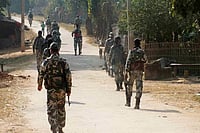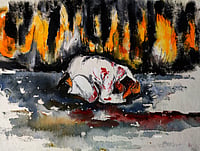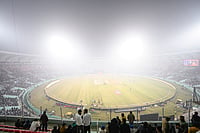THE last rains of the monsoon are tapering off. The Kathmandu valley wears a ghostly look, the surrounding hills wreathed in cloud with pockets of mist swirling around the pagodas of Swayambhu and Boudha. It's not hard to imagine that this was once an isolated Shangri La, untouched by modern urban blight or the distortions of European colonialism-especially if you cast your gaze upwards, towards the hilltops and the sky. Alas, this can be a dangerous practice. These days in Kathmandu, it's wise to keep your eyes riveted on the ground beneath and in front of your feet. For more than the air pollution that many Kathmandu residents insist perversely is worse than Delhi, this is a city of noxious rubbish heaps amid medieval splendour. A clean street corner or section of pavement becomes a dump overnight. And the trash stays for days. There's supposed to be municipal rubbish collection but it's hardly in evidence. Kathmandu's mayor, Keshav Sthapit, blames partisan politics for his city's rubbish woes. He's a member of one of Nepal's innumerable and quarrelsome Communist parties; the Central government, in charge of overall policy towards rubbish, is run by the Nepali Congress. The mayor's workers say rival political activists sneak around by night, dumping heaps of garbage so that people blame the city administration for the smell outside their gates. Talk about trashing your political opponents! Kathmandu's doughty residents are taking things in their, somewhat careful, stride. Some use rubbish heaps to give directions (turn left by the banana peels and mutton bones, our house is the red brick one); others say it at least keeps the dogs and cows away from the fresh food in the market.
Politics Of Trash

Politics Of Trash
Politics Of Trash
Published At:
MOST POPULAR
WATCH
MORE FROM THE AUTHOR
PHOTOS
×



















